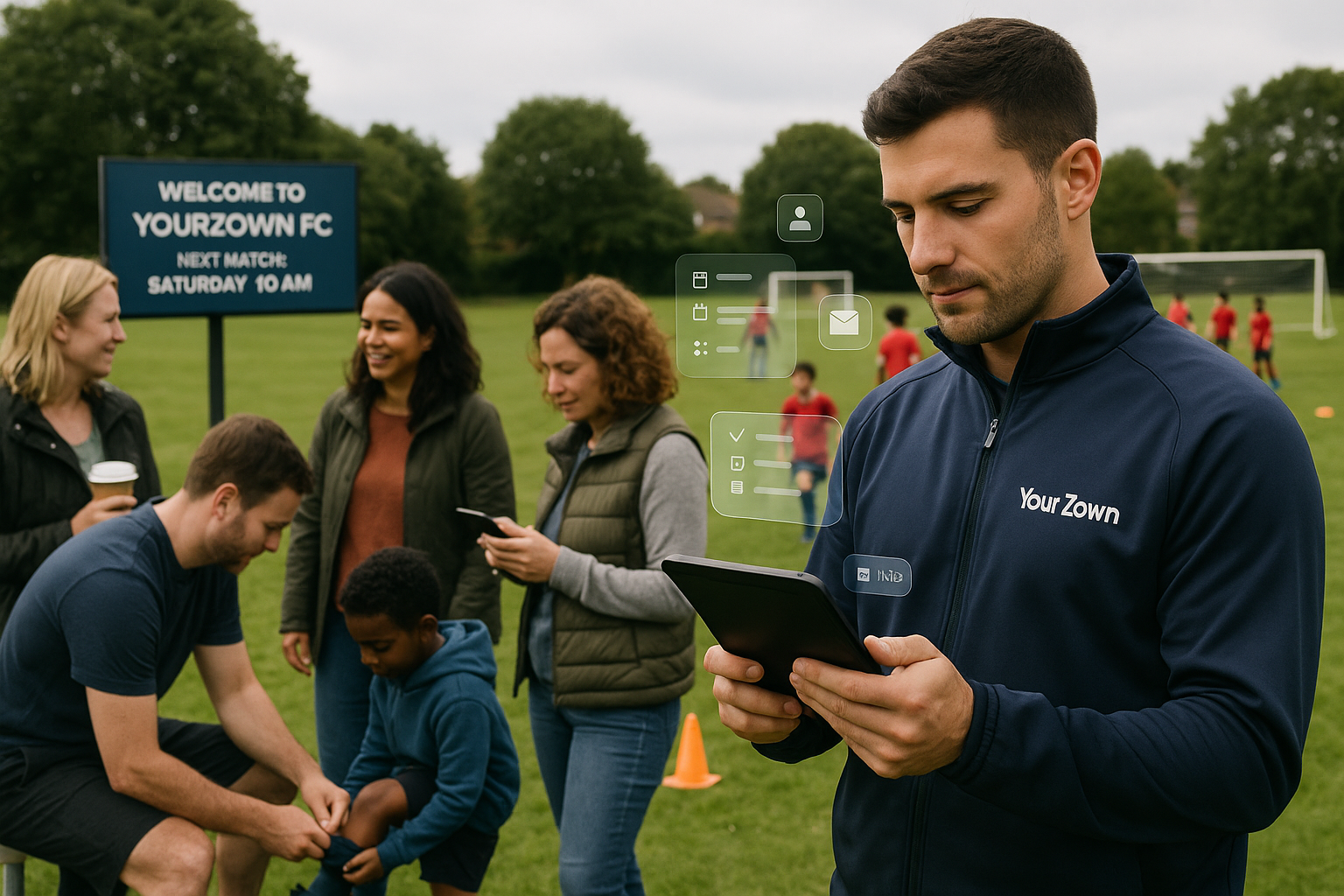Taking Ownership: Why Your Role in Community Clubs Matters
In our previous posts The Benefits of Community Engagement and Sports for All Ages, we explored the amazing benefits of joining a community club – from skills-building and making friends to boosting confidence and making a real-world impact. We've also highlighted the incredible dedication of the adult volunteers and organisers who keep these clubs running. Now, let's dive deeper into your active role, moving beyond simply being a member to becoming a true contributor.
It's More Than Just Showing Up
Being part of a community club isn't just about attending meetings or practices. It's about actively shaping the club's culture and contributing to its long-term health. Think of it like this: a club is like a garden. The organisers and volunteers might plant the seeds, but it's the members – you – who help it flourish.
Community clubs are more than just places to hang out after school or on weekends. They're vibrant hubs of activity, learning, and growth, offering a unique opportunity to connect with your community and discover new passions. But here's the thing: community clubs thrive on the active participation of their members, especially teenagers like you. This blog post explores why your role in a community club is crucial and how you can make the most of this experience.
Why Community Clubs Rock
Community clubs offer a wealth of benefits for teenagers. They provide a space to:
- Connect with like-minded people: Clubs bring together individuals with shared interests, fostering a sense of belonging and camaraderie. Whether you're passionate about sports, music, arts, or community service, there's a club out there waiting to welcome you .
- Develop valuable life skills: From teamwork and communication to problem-solving and leadership, the skills you gain in clubs are transferable to all aspects of life. These experiences equip you with the tools you need to navigate challenges, collaborate effectively, and achieve your goals .
- Boost your confidence: Stepping outside your comfort zone, trying new things, and contributing to something bigger than yourself can do wonders for your self-esteem. Clubs provide a supportive environment where you can explore your potential, take on challenges, and celebrate your achievements .
- Make a difference: Many clubs engage in community service, giving you a chance to give back and make a positive impact on the lives of others. Whether it's volunteering at a local shelter, organising a fundraising event, or participating in an environmental cleanup, you can contribute to creating a better world .
- Improve your mental health: Clubs provide a sense of purpose and connection, which can help reduce stress and anxiety. Engaging in activities you enjoy, surrounded by supportive peers and mentors, can boost your mood and overall well-being .
- Promote diversity and inclusion: Community clubs bring together individuals from different backgrounds, ages, and cultures, creating a space where everyone is welcome and everyone's voice is heard. This fosters understanding, respect, and appreciation for the richness of human experience .
Behind every successful community club is a dedicated team of adults who work tirelessly to create a positive and enriching experience for members. Coaches share their expertise and passion, guiding you to develop your skills and reach your full potential. Organisers put in countless hours behind the scenes, ensuring that everything runs smoothly and that the club remains a vibrant and welcoming space. And volunteers generously offer their time and support, contributing to the club's success in countless ways .
These individuals often face numerous challenges . Declining member numbers can strain resources and make it difficult to sustain programmes. Member disengagement can lead to a lack of participation and enthusiasm, hindering the club's overall vibrancy. Volunteer burnout can occur when individuals feel overwhelmed by the demands of their roles, leading to a shortage of support and a decline in morale.
Furthermore, clubs face the challenge of choosing the right platform to connect with members and promote their activities . In today's digital age, having an online presence is crucial for reaching a wider audience and engaging with members effectively. Clubs also need to be intentional about gathering members and fostering a sense of community. This involves creating welcoming and inclusive environments, organising engaging events, and providing opportunities for members to connect and contribute.
Showing your appreciation for the efforts of coaches, organisers, and volunteers can make a huge difference. A simple "thank you" or offering to help with tasks can go a long way in boosting morale and fostering a sense of shared responsibility.
Social Responsibility: Making a Difference Beyond the Club
Community clubs are not just about individual growth and enjoyment; they also have a broader social responsibility . They play a vital role in promoting social cohesion, addressing community needs, and creating positive change. As a teenager in a community club, you can contribute to these efforts in various ways.
- Support local initiatives: Participate in community service projects organised by your club. This could involve volunteering at a local charity, organising a food drive, or participating in an environmental clean-up .
- Promote inclusivity: Encourage and welcome members from diverse backgrounds. Create a club environment where everyone feels valued and respected, regardless of their race, ethnicity, gender, sexual orientation, or socioeconomic status .
- Advocate for positive change: If you see an issue in your community that your club could address, speak up and offer your ideas. This could involve raising awareness about environmental issues, promoting healthy lifestyles, or advocating for social justice .
By embracing social responsibility, you not only contribute to the well-being of your community but also strengthen the club itself . When members feel a sense of purpose and connection to something larger than themselves, it creates a stronger and more vibrant community.
Stepping Up: Your Responsibilities as a Member
Your role in a community club goes beyond simply attending sessions and following the rules. It's about actively contributing to the club's success and taking ownership of your experience. Here's how you can step up and make a difference:
- Be an active participant: Don't just be a passive observer. Engage in activities with enthusiasm, ask questions, offer your ideas, and contribute to discussions. Don't be afraid to step outside your comfort zone and try new things. You might discover hidden talents or passions you never knew you had !
- Respect others: Treat your fellow members, coaches, organisers, and volunteers with courtesy and kindness. Create a positive and inclusive environment where everyone feels welcome and valued. Celebrate the successes of others and offer support when needed. Remember, a strong community is built on mutual respect and support .
- Take initiative: Don't wait to be asked to help. Offer to assist with setting up equipment, cleaning up after sessions, or organising events. Your willingness to contribute will be greatly appreciated and will help the club run more smoothly .
- Communicate effectively: If you have concerns or suggestions, share them constructively with the appropriate person. Whether it's feedback for a coach, an idea for a new activity, or a concern about club policies, clear and respectful communication is essential for a thriving community .
- Be a role model: Demonstrate good sportsmanship, encourage others, and help create a positive team spirit. Congratulate teammates on their successes, even if you're feeling competitive. Offer support to those who are struggling and be a positive influence on younger members .
- Promote the club: Spread the word about your club and encourage others to join. Share your experiences with friends, family, and classmates. If your club has social media pages, help promote them by sharing posts and inviting others to follow. The more people who know about your club, the stronger and more vibrant it will become .
- Be responsible: Attend sessions regularly, be punctual, and follow the club's rules and guidelines. Your commitment and reliability contribute to the club's overall success and demonstrate respect for the time and effort of others .
By taking ownership of your role in a community club, you not only contribute to its success but also enhance your own experience. You'll gain valuable skills, build stronger relationships, and make a real difference in your community. Clubs offer a unique opportunity to explore your interests, develop your talents, and discover new passions. They can even help you develop your personal identity and explore potential career paths . So, step up, take charge, and make the most of your community club experience!
Conclusion
Community clubs are valuable assets that provide teenagers with a platform for personal growth, social connection, and skill development. While coaches, organisers, and volunteers play a crucial role in providing structure and support, teenagers also have a responsibility to actively contribute to the club's success. By being active participants, respecting others, taking initiative, communicating effectively, and being role models, teenagers can enhance their own experience and make a positive impact on their community.
Furthermore, community clubs foster a sense of social responsibility, encouraging teenagers to engage in activities that benefit the wider community. By embracing these responsibilities, teenagers not only contribute to the well-being of others but also strengthen the club itself and create a more vibrant and inclusive community. The success of a community club relies on the collective effort of all its members, and teenagers have a vital role to play in shaping its future.


